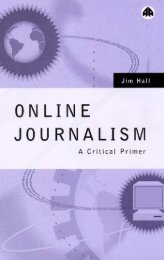Modul Mata Kuliah Journalisme Online - Ayo Menulis FISIP UAJY
Modul Mata Kuliah Journalisme Online - Ayo Menulis FISIP UAJY
Modul Mata Kuliah Journalisme Online - Ayo Menulis FISIP UAJY
Create successful ePaper yourself
Turn your PDF publications into a flip-book with our unique Google optimized e-Paper software.
None of this would have been possible had online journalism jettisoned the values of traditional<br />
journalism and embraced a Drudge-like mindset of looser standards in which a reporter is obligated to<br />
pass along any rumor or accusation that comes across his desk, without verifying its veracity.<br />
If they're to remain relevant in our increasingly digital society, online news operations need to<br />
experiment with new communication forms, to abandon the sheltered mindset of newsroom<br />
professionals and embrace a culture of true interactivity, to break some rules and offer idiosyncratic,<br />
fresh voices (especially young voices) to the public. But they must not abandon the standards of<br />
fairness, balance and trustworthiness that have served us so well.<br />
In the end, journalists — both print and online — must never forget that, ultimately, we're in the<br />
business of truth-telling, that service to our community is an essential underpinning of our craft, that<br />
our guiding principle should be less about getting the story first than getting it right, and that no amount<br />
of advertising dollars will rescue a news site that abandons its credibility.<br />
J.D. Lasica is senior columnist for the <strong>Online</strong> Journalism Review and served as editorial director of two<br />
Internet startups.<br />
Ethical Issues in <strong>Online</strong> Journalism<br />
http://www.poynter.org/content/content_view.asp?id=13007&sid=32<br />
12:00 AM Feb. 10, 2000<br />
Team Members: Jim Brown, John Garcia, Stephen Miller, Robin Palley<br />
The following points derive from a discussion about what we ought to be doing in online journalism,<br />
recognizing that everyday business pressures are often challenges to these principles. Nevertheless, the<br />
principles are desirable goals for behavior.<br />
General<br />
Ethical standards for online journalism are no different than traditional journalism.<br />
Data obtained through first amendment privilege (lower cost than offered to other businesses<br />
or individuals) should not be resold at a profit.<br />
Beware of novel attempts to influence content that are particular to the medium such as polling<br />
that may be influenced by activity on listservs or people who enter chat rooms with the intent to<br />
sell products.<br />
Standards for the intersection of content and commerce are still evolving but the credibility of<br />
content must not be compromised.<br />
Organizational structure should not impede the process of doing good journalism. News staff<br />
should report to news management.<br />
Content<br />
A sponsor should never control content.<br />
There should be no influence of advertising on editorial content. Often, one person synthesizes<br />
information from site metrics and feedback from users. That person often makes decisions<br />
related to both business concerns and editorial content. Such persons must clearly understand<br />
the inherent conflict of interest. Their role is clearly analogous to that of a publisher.<br />
There should be textual and visual standards for differentiating content and advertisements.
















